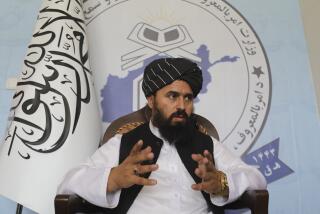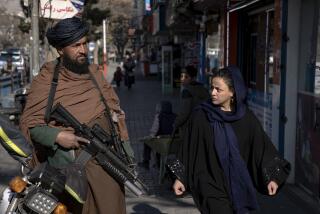Muslim Scholars Denounce Taliban
- Share via
In a growing intellectual challenge to Islamic practices abroad, leading Southern California Muslim scholars Thursday denounced the ruling Taliban’s destruction of Buddhist statues in Afghanistan as contrary to their faith’s laws and traditions.
“The senseless policy of the Taliban regime in Afghanistan of destroying statues is a reprehensible act that must be condemned by all Muslims,” said a statement signed by eight intellectuals at a forum convened by Minaret magazine and the Muslim Public Affairs Council in Los Angeles.
The Taliban announced last week that it would destroy all statues, including two towering 5th century images of Buddha carved out of the Afghan mountainside and hailed by art and religious historians as priceless cultural treasures. Although the decision has provoked worldwide protests--along with the burning of Korans in India--a Taliban spokesman defended the regime’s actions Thursday.
“When the world destroys the future of our children with economic sanctions [imposed by the United Nations in 1999], they have no right to worry about our past,” said Sayed Rahmatullah Hashemi, the Taliban’s roving ambassador who is scheduled to speak next Thursday at Town Hall in Los Angeles.
The Los Angeles meeting was the first attempt to bring four schools of Islamic thought together to forge a united position on a contemporary issue, according to Aslam Abdullah, Minaret editor. It reflected growing efforts by a network of Muslim intellectuals and human rights advocates linked by the Internet to challenge, on the basis of Islamic law, oppression that they believe is being falsely imposed in the name of Islam.
Earlier this year, for instance, Muslim scholars appealed to Nigerian authorities to grant clemency to a girl sentenced to 180 lashes for the crime of premarital sex. Asifa Quraishi, a doctoral candidate at Harvard Law School now living in Los Angeles, wrote a legal analysis arguing that no Islamic law justified such punishment, since the girl testified that she was coerced into sex.
Quraishi’s analysis--which was requested via e-mail by Muslim human-rights groups in South Africa and Malaysia--arrived too late to stop the flogging. But it was being forwarded to Nigerian authorities for future cases, she said.
“When you do a little research, you find that what is often claimed to be Islamic law often isn’t, and there’s a motivation to right the wrong,” Quraishi said.
Abdullah said he hoped to convene the scholarly round table regularly to forge intellectual leadership on such hot Islamic issues as authoritarianism in Muslim countries, interreligious marriages, spousal abuse and political activism. The group includes professors, authors and leaders of Islamic centers.
Quraishi said she acted in part because Nigerian authorities said they might change their policies if convinced on the basis of Islamic law, rather than on secular human-rights appeals. Likewise, Afghanistan’s ambassador to the United Nations indicated that he might listen to Islamic arguments, prompting Abdullah to organize the forum.
In a unanimous statement, the eight intellectuals said the Taliban’s destruction of statues violated the Koranic requirement to tolerate those of other faiths. The Koran’s sixth chapter, for instance, tells Muslims: “We have not set you as a keeper over them, nor are you responsible for them. . . . Abuse not those whom they worship besides Allah, lest they out of spite abuse Allah in their ignorance.”
Scholars also pointed out that Islamic rulers of the past had respected the religious and cultural treasures of lands they conquered, including Egypt.
However, two leading Islamic Web sites, islam.org and iviews.com, have carried lively debates on the issue, featuring several writers who defended the practice of destroying what they regard as idols and false gods. Several have pointed out that the Prophet Muhammad himself destroyed idols when he entered Mecca in the 7th century.
In addition, Taliban spokesman Hashemi said the decision had been made out of anger and frustration that international agencies were spending money to repair the Buddhist statues, yet doing nothing to address the plight of Afghan children, who he said were being ravaged by malnutrition. He said the statues had caused no problems for 1,500 years and were therefore tolerated, but now had become a hated symbol of Western preference for rock over Afghan lives.
In their statement, the scholars also said: “It is a shame to see that there is not much concern about the death and starvation of millions of human beings in Afghanistan and Iraq due to unjust sanctions or famine and disease in Africa. . . .”
Muzammil Siddiqi of the Islamic Society of Orange County said that justifying the statue destruction by citing Muhammad’s actions is not appropriate, since the prophet was struggling with widespread idolatry, which Islam prohibits.
Meanwhile, the Taliban’s actions continued to provoke widespread response. An interfaith statement of protest, signed by Amir Hussain of Cal State Northridge and 14 other scholars nationwide, was issued Thursday. The UCLA Chancellor’s Committee on Religion, Ethics and Values is scheduled to discuss the issue next week.
In the Buddhist community, however, the main reaction was one of quiet sadness.
“We are sad, but not angry,” said the Rev. Havanpola Shanti of the International Buddhist Meditation Center in Los Angeles. “Buddhism teaches nonviolence and that everything is impermanent. So why should we worry about these statues?”
More to Read
Sign up for Essential California
The most important California stories and recommendations in your inbox every morning.
You may occasionally receive promotional content from the Los Angeles Times.













